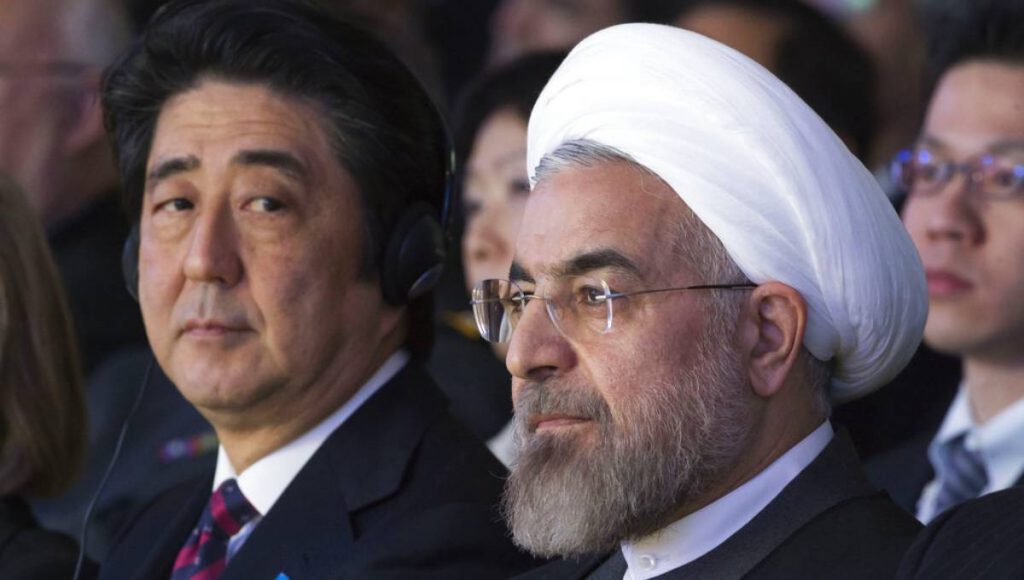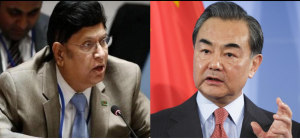Tehran, Jun 12 (AP/UNB) — With Japan’s prime minister on the way to Tehran for a historic visit, a hard-line Iranian paper published a front page image Wednesday of a mushroom cloud from a nuclear blast — a reference to America’s bombing of Hiroshima and Nagasaki at the end of World War II that underscores the challenge ahead for Shinzo Abe.
Abe’s trip is the highest-level effort yet to de-escalate tensions between the U.S. and Iran as Tehran appears poised to break the 2015 nuclear deal it struck with world powers, an accord that the Trump administration pulled out of last year. It’s also the first visit of a sitting Japanese premier in the 40 years since the Islamic Revolution.
But success may prove difficult for Abe, as the front page of the daily Farheekhtegan, or Educated, suggests.
“How Can You Trust A War Criminal, Mr. Abe?” the newspaper asked in dual English and Farsi headlines. Hard-line news outlets in Iran immediately picked up the front page from the paper, published by students of Islamic Azad University, which has campuses across the nation.
Iran is threatening to resume enriching uranium closer to weapons-grade level on July 7 if European allies fail to offer new terms for the nuclear deal. While President Donald Trump says he wants to talk to Tehran, the U.S. has piled on sanctions that have seen Iran’s currency, the rial, plummet, along with Iran’s crucial oil exports.
The U.S. also has sent an aircraft carrier and B-52 bombers to the region, along with hundreds more troops to back up the tens of thousands already deployed across the Middle East. The U.S. blames Iran for a mysterious attack on oil tankers off the coast of the United Arab Emirates, while Iranian-backed rebels in Yemen continue to launch coordinated drone attacks on Saudi Arabia.
Abe will arrive in Tehran on Wednesday afternoon as an interlocutor for Trump, who recently visited Tokyo. Abe will hold talks with Iran’s Supreme Leader Ayatollah Ali Khamenei and President Hassan Rouhani during his visit.
Abe acknowledged the challenge ahead just before he boarded his airplane at Tokyo’s Haneda Airport.
“There are concerns over rising tension in the Middle East region,” he said. “Japan wants to do as much as possible towards peace and stability in the region.”
Japan had once purchased Iranian oil, but it has now stopped over American sanctions. However, Mideast oil remains crucial to Japan and recent threats from Iran to close off the Strait of Hormuz, the narrow mouth through which a third of all oil traded by sea passes, has raised concerns.
Iran’s nuclear deal, agreed to at the time by China, Russia, France, Germany, the United Kingdom and the U.S., saw Tehran agree to limit its enrichment of uranium exchange for the lifting of crippling sanctions. Western powers feared Iran’s atomic program could allow it to build nuclear weapons, although Iran long has insisted its program was for peaceful purposes.
In withdrawing from the deal last year, Trump pointed to the accord not limiting Iran’s ballistic missile program and not addressing what American officials describe as Tehran’s malign influence across the wider Mideast. Those who struck the deal at the time described it as a building block toward further negotiations with Iran, whose Islamic government has had a tense relationship with America since the 1979 takeover of the U.S. Embassy in Tehran and subsequent hostage crisis.
Already, Iran says it quadrupled its production of low-enriched uranium. Meanwhile, U.S. sanctions have cut off opportunities for Iran to trade its excess uranium and heavy water abroad, putting Tehran on course to violate terms of the nuclear deal regardless.
Trump spoke Tuesday with Abe, said Yoshihide Suga, Japan’s chief Cabinet secretary. Suga declined to give any details about what they discussed. Abe also in recent days spoken with Israeli Prime Minister Benjamin Netanyahu, Saudi Crown Prince Mohammed bin Salman and Abu Dhabi’s Crown Prince Sheikh Mohammed bin Zayed Al Nahyan, all of whom are fierce critics of Iran.




